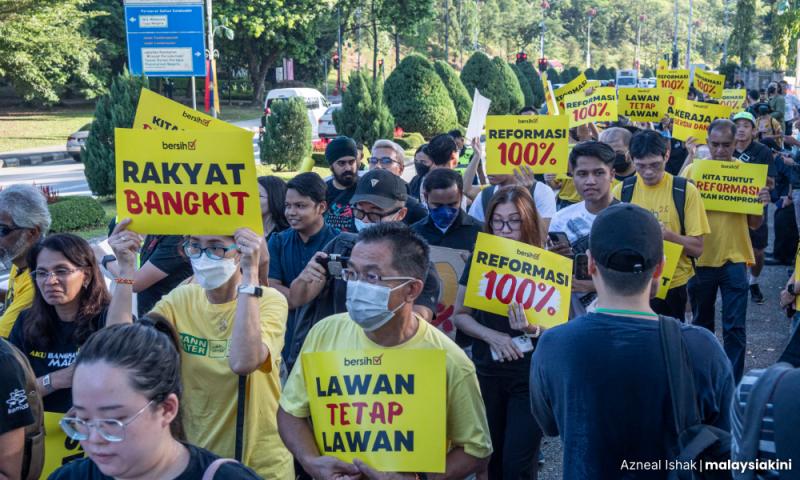LETTER | Peaceful assembly: Please respect the law
LETTER | There are two conflicting Court of Appeal decisions on Section 9(5) of the Peaceful Assembly Act 2012 (PAA).
The provision says a person who contravenes Section 9(1) commits an offence punishable with a fine not exceeding RM10,000.
Section 9(1) then stipulated that an organiser “shall, ten days before the date of an assembly, notify the Officer in Charge of a Police District in which the assembly is to be held.”
The “ten days before the date of an assembly” is now five days after amendments in 2019 vide the Peaceful Assembly (Amendment) Act 2019 (Act A1600).
In the earlier case of Nik Nazmi Nik Ahmad v Public Prosecutor (2014), the Court of Appeal ruled that Section 9(5) PAA was unconstitutional.
In the later case of Public Prosecutor v R Yuneswaran (2015), the Court of Appeal (Raus Sharif PCA, Mohd Zawawi Salleh and Zamani A Rahim JJCA) ruled unanimously that Section 9(5) PAA “is entirely constitutional, valid and enforceable”.

The court thus departed from the Nik Nazmi decision.
What’s your take on the two conflicting decisions of the same court?
Director of Lawyers for Liberty, Zaid Malek’s take is as follows:
“[T]he Court of Appeal have [sic] already struck down section 9(5) of the PAA for being unconstitutional in the case of Nik Nazmi bin Nik Ahmad v Public Prosecutor in 2014.
“The decision of the Court of Appeal in this case still stands and has not been overturned by a higher court.
“In 2015 another Court Of Appeal bench in PP v Yuneswaran gave an opinion that section 9(5) is constitutional and disagreed with the Nik Nazmi decision.
“However, the 2015 court could not overrule the earlier decision as both courts are of the same level.
“Only the Federal Court, which is a higher court, could have overruled the Nik Nazmi decision. This has never happened, and the decision remains valid and enforceable until now.”

Zaid’s take has been reported in Malaysiakini.
A different take can be seen in the recent case of Public Prosecutor v Ahmad Saiful Islam Mohamad [2023] where Hashim Hamzah JCA, who delivered the judgment of the Court of Appeal, said:
“[F]or criminal matters decided by the subordinate courts, the Court of Appeal is the highest court to determine any appeals arising thereof.
“In terms of judicial hierarchy, we hold that the principles governing the Federal Court in Dalip Bhagwan Singh are equally applicable to the Court of Appeal in such instances.
“For this appeal, when two decisions of the Court of Appeal conflict on a point of law, the later decision prevails over the earlier decision.
“If the subordinate courts can choose either decision of the Court of Appeal, there will be no finality to the issue and no certainty in the law. This would defeat the purpose of judicial precedent and stare decisis.
“Judicial hierarchy must be observed for the orderly development of legal rules and for the courts and lawyers to regulate their affairs, and to avoid chaos and misapprehensions in the judicial system.”
Differing verdicts
In Public Prosecutor v Yuneswaran, the Court of Appeal – like the court in Public Prosecutor v Ahmad Saiful Islam Mohamad – was the highest as the case originated in the subordinate court.
The principles in the Federal Court decision of Dalip Bhagwan Singh v Public Prosecutor (1998) apply. In that case, the apex court held:
“If the House of Lords, and by analogy, the Federal Court, departs from its previous decision when it is right to do so in the circumstances set out above, then also by necessary implication, its decision represents the present state of the law.
“When two decisions of the Federal Court conflict, on a point of law, the later decision therefore, for the same reasons, prevails over the earlier decision.”
My own humble take is to defer to the decision in Public Prosecutor v Ahmad Saiful Islam Mohamad.
In any case, the majority in Nik Nazmi ruled that Section 9(1) PAA was constitutional. This means that an organiser of an assembly must, five days before the date of an assembly, notify the district police chief in which the assembly is to be held.
So, it is mind-boggling that Kuala Lumpur police chief Datuk Allaudeen Abdul Majid should say that the police did not receive any notification of the “100 Percent Reform Demand Rally” organised by the Coalition for Clean and Fair Election (Bersih).

Bersih and Lawyers for Liberty should have been mindful of what was said by Hamid Sultan JCA in Nik Nazmi:
“I am of the considered view that the PAA 2012 (save for penal sanctions) is an Act within the spirit and intent of Article 10 of the Federal Constitution recognising freedom to assemble.
“The organisers should follow the restrictions stated in the Act and/or any reasonable restrictions stated by the police to maintain law and order and provide not only security but proper facilities to ensure citizens assemble without fear and in that process do not become victims of unexpected incidents.
“This is a social responsibility for the organisers and should not be compromised for any reason whatsoever.
“If the organisers do not comply with reasonable restriction there is no prohibition for the law enforcement agencies to take action as provided by the penal laws or other provisions of the [Criminal Procedure Code – CPC] to maintain law and order if reasonably necessary taking into consideration the right to assemble peacefully and without arms is an enshrined right.”
Respect the law.
The views expressed here are those of the author/contributor and do not necessarily represent the views of Malaysiakini.
RM12.50 / month
- Unlimited access to award-winning journalism
- Comment and share your opinions on all our articles
- Gift interesting stories to your friends
- Tax deductable
